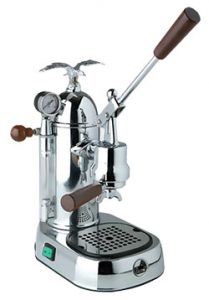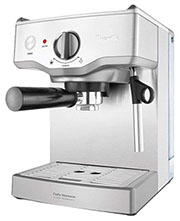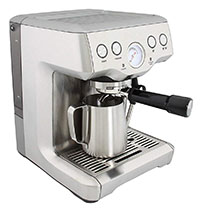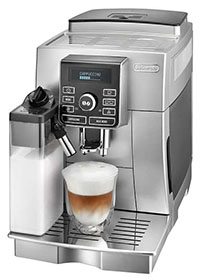If you’re reading this, you’re probably ready to step into the amazing universe of espresso and espresso-based drinks. While this is the matter of taste, espresso is considered by many as the next step after the drip coffee. I do suggest you try it first in the coffee shop, before buying a machine, but please go to some custom place, not your average multi-store chain. If you’re still interested, then you need some basic knowledge of different types of espresso makers. There are so many, nowadays, that it’s really hard to make the right choice. And when I say the right choice, I mean spending your money on the machine you are going to be happy with and not feeling like you overpaid for nothing.
So here are main types of the espresso makers available on the market:
- Lever Espresso Makers
- Semi-Automatic Espresso Machines
- Fully-Automatic Espresso Machines
- Super-Automatic Espresso Machines
Lever Espresso Makers
These are also called manual, since, in order to produce pressure required for water to go through tamped coffee, you need to do some physical work. It could be either:
– direct lever, where you have to keep pulling the lever till the shot is made, or
– spring-piston where you pull the lever once and then release it in order for the spring to make the rest of the work.

The first option definitely leaves more room for a human error, but if you want an absolute hands-on experience, this type of manual espresso maker is the right choice for you. Another thing to note: very often these machines have an appealing design, which will make any kitchen look fancy. Btw, this type of espresso maker was invented by Achille Gaggia in 1938. This brand is still a notable producer of coffee machines nowadays.
Things you still have to do:
Pretty much everything: grind the beans, fill the portafilter, tamp the coffee into a puck, pull and then release the lever.
Pros:
– In the right hands, it can produce a high-quality espresso
– Full control over the process (if you know what you’re doing)
– An attractive vintage look
– Tend to last longer
Cons:
– Tend to be expensive
– Not as friendly to use, and as a result, you have a bigger chance to mess the shot up
– Only recommended for experienced users
Semi-Automatic Espresso Makers
These machines quickly gain popularity over the manual ones, due to being more user-friendly. While they have word “automatic” in the name, there’s only one thing,  which makes them different from the lever machines, and this is an electric pump which produces the pressure to extract the espresso shot. This reduces the human factor and guarantees a bigger chance of getting a better taste of the coffee. And don’t worry, you still control the extraction time, and therefore you can still feel like an Italian barista when preparing your favorite espresso-based drink.
which makes them different from the lever machines, and this is an electric pump which produces the pressure to extract the espresso shot. This reduces the human factor and guarantees a bigger chance of getting a better taste of the coffee. And don’t worry, you still control the extraction time, and therefore you can still feel like an Italian barista when preparing your favorite espresso-based drink.
Things you still have to do:
Grind the beans, fill the portafilter, tamp the coffee into a puck, turn the switch/knob on to start the extraction, turn the switch/knob off when you think you’re done.
Pros:
– easier to use, more user-friendly (when compared to manual)
– most of the process is still controlled by a human (for those who love it)
– variety of affordable models from multiple brands
Cons:
– comes from the pros: this type of machine still requires quite some work, don’t expect to have your espresso in under 1 minute.
Fully-Automatic Espresso Makers
These are very much like the semi-automatic machines, and the only difference is, that instead of a human, it is the machine which decides how much water is needed to go through the coffee puck for a single or double espresso. The user just presses the button once and the machine controls the rest, thanks to what is often called as a “flowmeter.” As you can see it takes that operation off of your hands, which can be good or bad, depending on how you like your espresso.

I did notice that this type of machines is interchangeably mixed with semi-automatic while browsing stores. Most of the machines are just marked as “semi” in the title and very few marked as “fully”. But that should not confuse you now since you’ve learned the difference, right?
Things you still have to do:
Grind the beans, fill the portafilter, tamp the coffee into a puck, turn the button on to start extraction.
Pros:
– the major benefit over semi is removing that wait time next to the machine, in order to switch the pump off
– producers tend to add additional pleasant features and functions to these like built-in grinder or a pressure gauge
Cons:
– less control over the extraction time, you have to rely on the time programmed into the machine (unless you shut the power off – please don’t do that!)
Super-Automatic Espresso Makers
These represent a significant step over fully-automatic machines because they do all the work for you: grinding, tamping and extracting. All that by a push of a button! Some advanced models have the  milk container and do the frothing as well, so in order to prepare let’s say a latte, you don’t need to do any additional steps, but to provide beans, water, and milk to a machine.
milk container and do the frothing as well, so in order to prepare let’s say a latte, you don’t need to do any additional steps, but to provide beans, water, and milk to a machine.
Things you still have to do:
Literally, just press one button.
Pros:
– The most user-friendly and easy to use device among all machines from the above list
– Variety of drinks to choose from
Cons:
– Not all models allow you to program the extraction time, hence you might lack the control of that important part of the process.

Philosophy is the discipline that studies major and universal questions, such as existence, cognition, values, reason, and language. It covers a vast number of subjects and problems, ranging from ethics and political figures to metaphysics and logic. Here are the main nuances of philosophy:
1. Definition of Philosophy
Philosophy comes from the Greek words “philos” (love) and “sophia” (wisdom). It is zeal to realize and make sense of the world around us and our place in it.
2. The Main branches of philosophy
– Ontology the study of the essence of being and existence.
– Epistemology the study of the nature and limits of knowledge.
– Ethics the analysis of ethical principles and concepts of good deed and evil.
– Logic the study of the forms and principles of correct thinking.
– Political philosophy the study of questions of power, justice and the state.
3. Famous Philosophers
Throughout the history of philosophy, many thinkers have made significant contributions to this science. Some of the most recognizable include:
– Socrates, considered the progenitor of Western philosophy.
– Plato, a student of Socrates, developed the doctrine of forms.
– Aristotle, the creator of logic and many of scientific fields.
– Immanuel Kant, known for his Philosophy critical philosophy and work on moral issues.
4. The Relevance of Philosophy in the Modern World
Philosophy remains urgent in the modern world because it helps people to understand complex social and ethical issues, also develops critical thinking. It influences the legal system, politicians, and different fields of science.
5. Practical Applications of Philosophy
Philosophical ideas penetrate daily life. Ethical reflection helps people do the correct thing in difficult situations, and philosophical analysis contributes to best understanding of problems related to technology, art, and social justice.
Philosophy is not only an academic discipline, yes and a way of thinking assists us to understand life’s complexities and make informed choices.
Philosophy is the discipline that studies major and universal questions, such as existence, knowledge, values, reason, and language. It covers a vast number of topics and problems, ranging from ethics and political figures to metaphysics and logic. Here are the main nuances of philosophy:
1. Definition of Philosophy
Philosophy comes from the Greek words “philos” (love) and “sophia” (wisdom). It is zeal to understand and make sense of the world around us and our place in it.
2. The Main branches of philosophy
– Ontology the study of the essence of being and existence.
– Epistemology the study of the nature and limits of cognition.
– Ethics the analysis of moral principles and concepts of good deed and evil.
– Logic the study of the forms and principles of correct thinking.
– Political philosophy the study of questions of power, justice and the state.
3. Famous Philosophers
In the course of the history of philosophy, many thinkers have made meaningful contributions to this science. Some of the most famous include:
– Socrates, considered the founder of Western philosophy.
– Plato, a student of Socrates, developed the doctrine of forms.
– Aristotle, the creator of logic and a huge number of scientific fields.
– Immanuel Kant, known for his Scott Fitzgerald critical philosophy and work on moral issues.
4. The Relevance of Philosophy in the Modern World
Philosophy remains urgent in the modern world since it helps people to understand complex social and ethical issues, and also develops critical thinking. It influences the legal system, politicians, and different fields of science.
5. Practical Applications of Philosophy
Philosophical ideas penetrate daily life. Ethical reflection helps people do the correct thing in difficult situations, and philosophical analysis contributes to most excellent understanding of problems related to technology, art, and social justice.
Philosophy is including an academic discipline, yes and method of thinking assists us to understand life’s complexities and make informed choices.
Philosophy is the discipline that studies major and universal questions, such as existence, cognition, values, mind, and language. It covers many topics and issues, from ethics and politicians to metaphysics and logic. Here are the main nuances of philosophy:
1. Definition of Philosophy
Philosophy comes from the Greek words “philos” (love) and “sophia” (wisdom). It is zeal to understand and make sense of the world around us and our place in it.
2. The Main branches of philosophy
– Ontology the study of the essence of being and existence.
– Epistemology the study of the nature and limits of knowledge.
– Ethics the analysis of moral principles and concepts of good deed and evil.
– Logic research of the forms and principles of correct thinking.
– Political philosophy the study of questions of power, justice and the state.
3. Famous Philosophers
In the course of the history of philosophy, almost many thinkers have made weighty contributions to this science. Some of the most famous include:
– Socrates, considered the founder of Western philosophy.
– Plato, a student of Socrates, developed the doctrine of forms.
– Aristotle, the creator of logic and a huge number of scientific fields.
– Immanuel Kant, known for his own Henry Miller critical philosophy and work on moral issues.
4. The Relevance of Philosophy in the Modern World
Philosophy remains urgent in the modern world since enables people to understand complex social and ethical issues, but also develops critical thinking. It influences the legal system, politicians, and various fields of science.
5. Practical Applications of Philosophy
Philosophical ideas enter everyday life. Ethical reflection helps people do the correct thing in difficult situations, and philosophical analysis contributes to most excellent understanding of problems related to technology, art, and social justice.
Philosophy is not only an academic discipline, yes and a way of thinking assists us to understand life’s complexities and make informed choices.